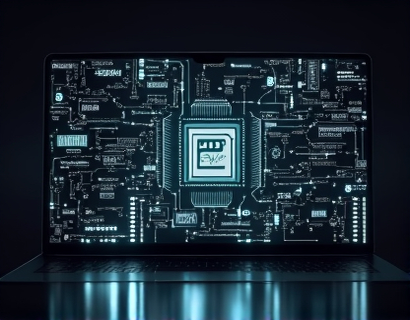Mastering Anonymous Operations: Cutting-Edge Pseudonym Software for Blockchain and AI Privacy Compliance
In the rapidly evolving landscape of technology, the need for robust privacy solutions has become paramount, especially in the realms of blockchain and artificial intelligence. As digital transactions and interactions increasingly permeate every aspect of our lives, ensuring anonymity and compliance with regulatory standards has become a critical concern for tech users. This article delves into the advanced software solutions designed to create and manage secure pseudonyms, enabling users to conduct anonymous operations in blockchain and AI environments while adhering to stringent privacy regulations.
The concept of pseudonymity in digital operations involves the use of a temporary or alias identity to conceal one's true identity. In the context of blockchain and AI, this is achieved through sophisticated software that generates and manages pseudonyms, ensuring that users can engage in transactions and interactions without revealing their real-world identities. These solutions are not only essential for maintaining personal privacy but also for complying with various regulatory frameworks that mandate data protection and anonymity.
One of the primary challenges in blockchain and AI privacy is the inherent transparency of these technologies. Blockchain, by design, is a decentralized and immutable ledger that records all transactions in a public manner. Similarly, AI systems often require access to vast amounts of data, much of which can be personally identifiable. To address these challenges, cutting-edge pseudonym software has emerged, offering a layer of anonymity that protects user identities while facilitating legitimate use cases.
These advanced software solutions work by generating unique, non-reversible pseudonyms for each user. This process involves complex algorithms that create a distinct digital identity, which is linked to the user's actions in the blockchain or AI system but remains untraceable to their real identity. The pseudonyms are designed to be used for a specific period or for a limited number of transactions, after which they are automatically discarded or updated, ensuring continuous privacy and compliance.
The integration of these pseudonym solutions into blockchain and AI systems is seamless and enhances overall security. By abstracting the user's identity, these tools reduce the risk of identity theft and unauthorized access to sensitive information. Moreover, they help in mitigating the risks associated with regulatory non-compliance, as they ensure that user data is handled in accordance with privacy laws such as the General Data Protection Regulation (GDPR) and the California Consumer Privacy Act (CCPA).
To understand the technical underpinnings of these pseudonym solutions, it is essential to explore the key components and mechanisms involved. At the core of these systems are cryptographic techniques that ensure the integrity and confidentiality of the pseudonyms. Public-key cryptography plays a crucial role, allowing users to generate and manage their pseudonyms securely. Each pseudonym is associated with a public key, which can be shared openly without compromising the user's identity.
Another critical aspect is the use of zero-knowledge proofs, a cryptographic method that enables one party to prove to another that a statement is true without revealing any information beyond the truth of that statement. In the context of pseudonym software, zero-knowledge proofs can be used to verify transactions or AI model inputs without exposing the underlying identity. This ensures that the system remains transparent and trustworthy while maintaining user anonymity.
Furthermore, these software solutions often incorporate decentralized identity management systems. Decentralized identities (DIDs) provide users with full control over their digital identities, allowing them to create, manage, and share their pseudonyms without relying on centralized authorities. This decentralized approach not only enhances privacy but also reduces the risk of single points of failure and censorship.
For blockchain applications, the pseudonym solutions are particularly beneficial in scenarios such as decentralized finance (DeFi), where users engage in lending, borrowing, and trading without traditional financial intermediaries. By using pseudonyms, users can participate in these financial activities while keeping their transactions private and compliant with regulatory requirements. This is especially important as DeFi platforms continue to grow and attract more users, increasing the need for robust privacy and security measures.
In the realm of AI, pseudonym software is equally vital. AI systems often require access to sensitive data for training and operation, raising significant privacy concerns. Pseudonym solutions enable the use of anonymized data, ensuring that individual identities are protected while still allowing AI models to learn from diverse and representative datasets. This approach not only enhances the ethical use of AI but also helps in meeting regulatory standards for data protection.
To illustrate the practical benefits of these pseudonym solutions, consider a scenario where a user wants to participate in a blockchain-based voting system. Using a pseudonym, the user can cast their vote without revealing their identity, ensuring both the integrity of the voting process and the voter's privacy. Similarly, in an AI-driven healthcare application, patient data can be anonymized using pseudonyms, allowing for advanced analytics and personalized treatments while safeguarding patient confidentiality.
The development and deployment of these pseudonym solutions require a multidisciplinary approach, combining expertise in cryptography, software engineering, and regulatory compliance. Teams of experts work together to design systems that are not only technically robust but also user-friendly and scalable. Continuous research and development are essential to stay ahead of emerging threats and regulatory changes, ensuring that the pseudonym solutions remain effective and compliant.
For privacy-conscious tech users in the blockchain and AI space, adopting these advanced pseudonym software solutions is a strategic move. By leveraging these tools, users can enjoy the benefits of decentralized technologies while maintaining control over their personal information. The seamless integration of pseudonym solutions into existing blockchain and AI systems makes it easier than ever for users to enhance their digital privacy and comply with regulatory standards.
In conclusion, the future of digital privacy in blockchain and AI lies in the adoption of cutting-edge pseudonym software. These innovative solutions provide a balance between transparency and anonymity, enabling users to engage in secure and compliant digital operations. As technology continues to evolve, the importance of such privacy tools will only grow, making them an essential component of any digital strategy for privacy-conscious individuals and organizations.










































